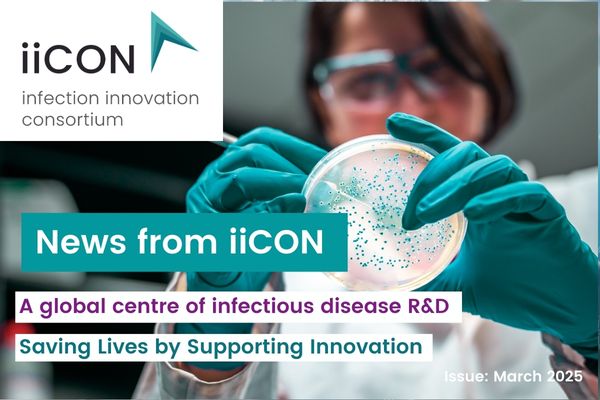- Join the Innovation Journey
- Our Platforms
Collaboration to improve in vivo antibiotics testing

New antibiotics are crucial in the fight against antimicrobial resistance. Assessing the effectiveness of new antibiotics requires standardised high-quality infection models, readily available to stakeholders developing new antibacterial treatments. The Innovative Medicines Initiative project COMBINE is developing a standardised in vivo pneumonia model to test small molecule antibiotics. This model is now being evaluated through a unique collaboration with some of the main actors in the field: CARB-X & CAIRD, iiCON, and Pharmacology Discovery Services.
Through this collaboration, key stakeholders will be able to share expertise and data, strengthening the validation studies of the COMBINE pneumonia model through testing by multiple organisations. This is part of an ongoing effort to develop a standardised protocol for the in vivo pneumonia model. Data from the model will also support the establishment of a reference strain bank of clinically relevant, well-characterized Gram-negative strains. COMBINE is also providing a framework to bridge the gap between preclinical data and clinical outcomes using mathematical modeling approaches.
The pneumonia model will support harmonisation, and the collaboration between COMBINE, CARB-X, CAIRD, iiCON and Pharmacology Discovery Services will improve quality through input and advice on the general strategy and standardisation parameters. The collaboration has been consolidated through agreements that enable the sharing of data and expertise, and exchange of ideas on study design for validation and benchmarking studies. The work on the pneumonia model is led by a team at Statens Serum Institut in Denmark, with COMBINE in vivo experiments will be performed at three different project partner sites: Statens Serum Institut, Paul-Ehrlich-Institut and GSK in order to test reproducibility between different laboratories.
“I am pleased that the protocol that COMBINE has developed for the standard pneumonia model works well with the isolates and antibiotics tested so far. Further studies are now in progress to fully characterise the model, and we look forward to making the protocol available to the AMR community,“ said Lena Friberg, Professor of Pharmacokinetics and Pharmacodynamics at Uppsala University, who is leading the COMBINE efforts on translation.
CARB-X will play an important role in this work by supporting the validation of the pneumonia model with approved antibiotics used in clinical settings, with CAIRD leading the work to provide a benchmark for new experimental antibiotics through back-translation of clinical data from human plasma and lungs.
iiCON, a consortium led by Liverpool School of Tropical Medicine (LSTM) with core partners LifeArc, Unilever, Evotec, Liverpool University Hospitals Foundation Trust, University of Liverpool, and Infex Therapeutics, is another strategic partner.
iiCON partners within the Antimicrobial Pharmacodynamics and Therapeutics (APT) group at the University of Liverpool and Infex Therapeutics are working to support the development of experimental models of invasive bacterial and fungal diseases and mathematical modelling to ensure optimal dose selection. Another important part of the work will be facilitated by Pharmacology Discovery Services, supplying data on the efficacy of standard antibiotics in mouse lung infection models.
Professor Janet Hemingway, founding director of iiCON, said: “In the global fight to combat antimicrobial resistance (AMR) , knowledge sharing and collaboration is essential to drive forward new solutions. We’re delighted to be supporting the evaluation of COMBINE’s pneumonia model and to be working together with these key global organisations to pool our expertise and jointly advance our capability against AMR.”
COMBINE has a coordinating role in the AMR Accelerator, a cluster of public-private partnership projects funded by the Innovative Medicines Initiative (IMI). The initiative brings together academia, pharma industry, patient organisations, non-profits and small and medium sized companies to develop a robust pipeline of antibiotics. “We are excited to bring standardised tools to those working to fill the pipeline with new antibiotics, and proud to be part of a community of stakeholders working together to combat antimicrobial resistance”, said Anders Karlén, Professor of Computer-Aided Drug Design & project coordinator.


